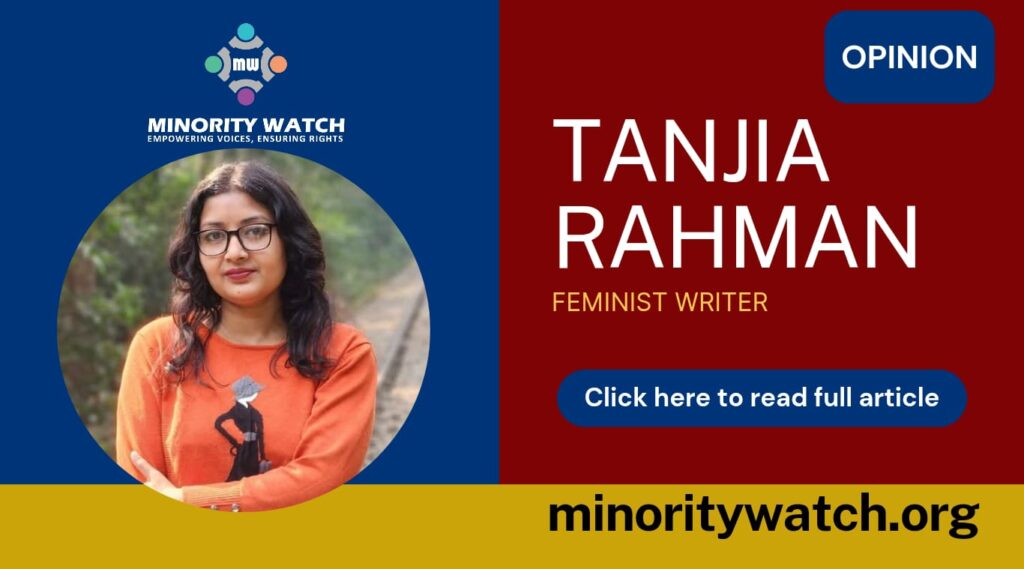Tanjia Rahman: Violence against women is a pervasive issue that transcends borders and cultures. The extent and nature of such violence have varied throughout history and continue to differ across societies today. From birth to old age, women face violence in different forms at different stages of life.
Violence against women refers to crimes that are primarily or exclusively targeted at women. This violence can be inflicted by individuals or even by the state. Acts of violence committed by individuals include rape, domestic abuse, sexual harassment, forced reproductive control, female infanticide, gender-based abortion, childbirth-related violence, honor killings, dowry-related violence, female genital mutilation (FGM), and forced marriages. Meanwhile, state-inflicted violence may involve wartime sexual violence, conflict-related sexual violence, sexual slavery, forced abortions, and violence perpetrated by police or authoritative officials. Certain criminal networks also contribute to violence against women, including human trafficking and forced prostitution.
A closer look at these incidents reveals that, in most cases, the perpetrators are family members, relatives, or individuals familiar to the victim. While men are often responsible, women too can be perpetrators of violence against other women. Women are sometimes targeted for their achievements, awareness of their rights, or independent mindset. Cultural traditions and religious practices in some societies also perpetuate violence against women. Misogyny, hatred towards women, and inherently violent tendencies further contribute to such abuse.
In war-torn regions, violence against women reaches extreme levels. Wartime sexual violence refers to acts like rape and sexual abuse committed by soldiers or armed forces during conflict or military occupation. In such scenarios, women are often forced into prostitution or sexual slavery by occupying forces.
In several Muslim-majority countries, harsh and barbaric punishments against women still persist. Practices such as flogging and stoning to death continue in some regions despite their cruelty and inhumanity.
Domestic violence, rape, and sexual harassment are prevalent in almost every country worldwide. Domestic violence, in particular, holds a significant portion of overall violence against women. This form of abuse encompasses physical, verbal, psychological, financial, reproductive, and sexual violence. It may escalate to severe assaults, genital mutilation, acid attacks, or even murder, often resulting in lifelong disability or death.
In developing and underdeveloped nations, violence against women is more rampant, often exacerbated by low education rates and social instability. Gender-based abortion, particularly the forced termination of pregnancies carrying female fetuses, is disturbingly common in such regions. Despite legal restrictions in several countries that prohibit disclosing the fetus’s gender, these practices continue to persist. In some families, newborn girls are still killed shortly after birth.
Female genital mutilation remains a cultural practice in various societies, particularly in parts of Africa and Indonesia. Certain communities in the Arabian Peninsula also continue this practice. Countries like Egypt, Sudan, Ethiopia, and Mali report particularly high rates of FGM.
Honor killings, a form of violence deeply tied to cultural and religious beliefs, are prevalent in parts of the Middle East, North Africa, India, and the Philippines. In these cases, female family members are often murdered by male relatives under the pretext of preserving family honor when they are perceived to have brought shame or disgrace to the family name.
Although violence against women exists globally, developed nations have seen reduced rates due to education, awareness, and strict legal frameworks. However, through immigration, some cultural and religious forms of violence have spread to these countries. Nonetheless, the enforcement of strong legal measures and severe penalties for offenders helps minimize such crimes.
To combat violence against women, education, public awareness, robust legal systems, and ensuring accountability for perpetrators are essential steps. Only through these measures can we hope to create a safer and more equitable world for women everywhere.
• Tanjia Rahman, Feminist Writer & Activist
Publication Date: 27 March, 2025
এই আর্টিকেলটি বাংলায় পড়তে চাইলে এখানে ক্লিক করুন
Read more news in this category
[The opinions published in MinorityWatch belong solely to the author]







